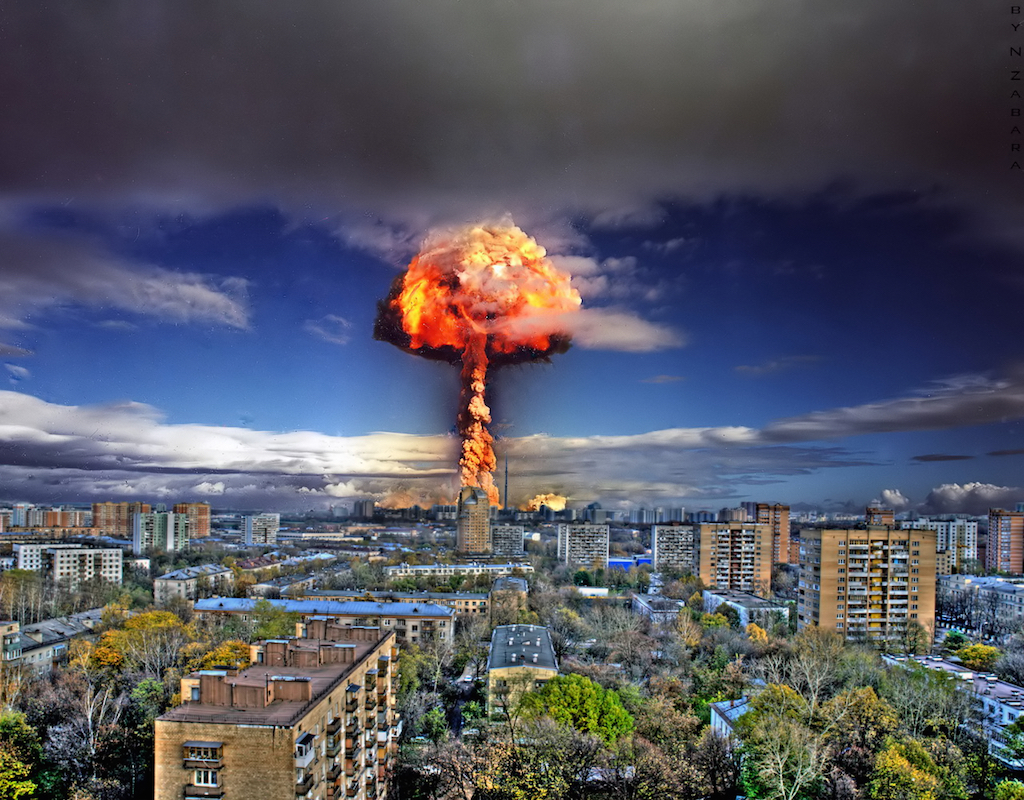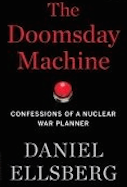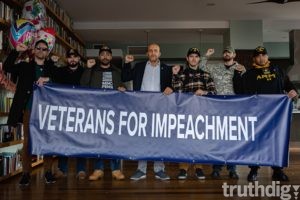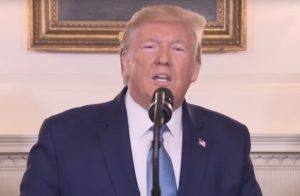Daniel Ellsberg on Dismantling the Doomsday Machine
The Pentagon Papers whistleblower explains how the danger of nuclear weapons might be conveyed more effectively to the general public. A rendering of a nuclear explosion in a city. (Mihan(AKA)Zed / CC BY-SA 3.0)
A rendering of a nuclear explosion in a city. (Mihan(AKA)Zed / CC BY-SA 3.0)
More than 45 years after he became famous for leaking the Pentagon Papers and earning the wrath of President Richard Nixon and his plumbers, Daniel Ellsberg is again a focus of public consciousness. The hit movie “The Post” reprises part of the Pentagon Papers story, reminding older Americans (and explaining to younger viewers) how Ellsberg’s decision to reveal a top-secret history of duplicitous U.S. policy in Indochina changed the course of the Vietnam War and American history. And shortly before “The Post” premiered early in January, Ellsberg’s latest book, “The Doomsday Machine: Confessions of a Nuclear War Planner,” was published to significant national media attention.

Purchase in the Truthdig Bazaar
In the book, Ellsberg chronicles his early career as a RAND Corporation analyst deeply involved in the crafting of American nuclear war plans in the 1960s—plans that were meant to be more controlled and discriminating than earlier versions but, he came eventually to understand, were actually blueprints for the obliteration of civilization. “Working, conscientiously, obsessively, on a wrong problem, countering an illusory threat, I and my colleagues at RAND had distracted ourselves and helped distract others from dealing with the real dangers posed by the mutual superpower pursuit of nuclear weapons—dangers which we were helping make worse—and from real opportunities to make the world more secure,” Ellsberg writes. “Unintentionally, yet inexcusably, we made our country and the world less safe.”
Since the 1970s, Ellsberg has been deeply involved in efforts to reduce world nuclear arsenals and eventually eliminate them altogether. He and I spoke at length earlier this year about how the danger of nuclear weapons might be conveyed more effectively to the general public. What follows is an edited transcript of parts of that wide-ranging conversation.
John Mecklin: For those few people in the world who haven’t read your book yet, why did you write it now?
Daniel Ellsberg: I drafted the first part of the book really 40 years ago, just after the [Vietnam] war ended in 1975. My publisher then said they would sell 1,400 copies, which meant that they would not publish it. Really, I tried a couple of other times. There was no interest in publishing.
I spent all my time trying to help build an anti-nuclear movement, like the anti-war movement. My full-time job was in work on the bilateral nuclear weapons freeze and various other things. I was getting arrested in civil disobedience actions, 87 times up till now. I was doing that and getting interviewed a lot and speaking on this subject all the time but with no national attention, whatever, to either the arrests or the lectures or the interviews or anything like that. Many people thought I just disappeared all that time. Actually, I was being pretty active in getting a lot of local coverage, but no national coverage at all.
Then, I actually worked on a project called Manhattan Project II. The idea was that between 1992 and 1995, the 50th anniversary of the Manhattan Project, we would do something to undo the Manhattan Project and at least develop a program for dismantling the doomsday machines. Actually, we did get a pretty good program, but almost none of it has come close to being enacted. That was back in 1995.
Then, I wrote my book “Secrets: A Memoir of Vietnam and the Pentagon Papers.” Then, I turned to this book, essentially. Actually, finally, to cap that story off, this book was rejected by, I think it was 17 other publishers and finally seized on by Bloomsbury enthusiastically. That’s how it came about now.
John Mecklin: It’s interesting. One wouldn’t think that somebody as famous as you would have such a hard time getting this published.
Daniel Ellsberg: On this subject. Look, I had a very high-level agent at one point who said, “Dan, I won’t represent you on a nuclear book, period.”
John Mecklin: Why do you think that is?
Daniel Ellsberg: Because a book with the word “nuclear” in the title was thought to be poison. As far as I can tell, I’m getting a very good reception now. And coverage. I can’t do better, really. I guess I have to thank Trump for that. He’s focused people now on the possibility of nuclear war and the possible imminence of nuclear war. I think at this very moment, just by coincidence, in a way, the book has gotten attention.
John Mecklin: It’s gotten a lot of attention.
Daniel Ellsberg: It’s not as though there have been no books. There have been marvelous books, like Eric Schlosser’s “Command and Control,” a wonderful book. It did, in fact, get a lot of attention, but unfortunately, I think most of the attention went to how to make it a little less likely that nuclear accidents will occur, which is indeed a problem. But the big problem is sending off the entire arsenal of either the U.S. or Russia, which, again, with nuclear winter, which we know about now, has the potential for ending most human life, if not all of it.
In the case of a large war, war that’s escalated to the size of our larger attack options—some of which I was involved in writing guidance for in 1961 and which have remained the same ever since, by all testimony—it wouldn’t make any difference which side went first. The result would be the same in either case. It would not result from the blast or the fallout, but from the smoke that would cover the whole globe in a way that intense fallout would not.
John Mecklin: The major media tend to almost never actually confront or describe the actual effects of a major nuclear war. Why do you think that is?
Daniel Ellsberg: That’s hard for me to say, really. I certainly agree with you. I would say they have been shockingly derelict in reporting this. I can’t give an answer. I haven’t been able to ask their editors what’s going on
But it’s a very interesting question. My speculative answer would have to be that the major media have always supported basically—until quite recently perhaps—our basic nuclear arsenals. Insane as they are. They’re unjustifiable, if you really look at them critically. And yet they’re treated as though they are reasonable responses to the nuclear era, which they are not. Nothing reasonable about them at all.
You would not have these arsenals, in the U.S. or elsewhere, if it were not the case that it was highly profitable to the military-industrial complex, to the aerospace industry, to the electronics industry, and to the weapons design labs to keep modernizing these weapons, improving accuracy, improving launch time, all that. The military–industrial complex that Eisenhower talked about is a very powerful influence. We’ve talked about unwarranted influence. We’ve had that for more than half a century.
John Mecklin: But nuclear planners inside the U.S. government have to know that a few hundred nuclear warheads would deter anyone from attacking.
Daniel Ellsberg: Yes, they have said that. It’s a radical statement from the point of view of our actual arsenal. Yet, when you think about it, if you talk about deterring attack, think hard. Hundreds of weapons? Are we kidding here? Would it take hundreds of operational weapons to deter a U.S. attack using thermonuclear weapons in North Korea or Iraq or Iran—or would it take one? One might not be so reliable in terms of the possibility of eliminating it in a first strike, but how about 10, or could we get up to 30? But hundreds? Hundreds of U.S. cities on retaliation, let’s say, or dozens, scores? That’s absurd. What I’ve been saying here and what hasn’t been brought up in the past is these radical proposals of going down to 300 or 200 [nuclear warheads]—the U.S. government doesn’t get close to supporting them—but [the proposals] themselves are enormously greater than could be justified by the one objective of deterring nuclear attack.
Hundreds of weapons—first of all, unless they’re somehow all managed to be far from cities to burn, give you nuclear winter or a form of nuclear winter or nuclear famine. Even aside from that, the blast and the fallout and the radiation are of continental scale, basically, in their exterminating effects.
How then do we get to the thousands? I’ll go all the way back now to 1949 and ’50, when the Russians first got nuclear weapons. Suddenly, we acquired all of their possible airfields as possible targets, and then the Russian missiles [were made part of the U.S. nuclear targeting plan]. If you want to have reliability—because our early missiles were far from reliable—you get at least two warheads for every warhead you’re going after over there. Then, more [warheads] than that, if it’s hard targets you’re talking about.
There’s only one little caveat on this process of targeting: How are you really going to keep them from having dozens, scores, or even hundreds of warheads left, as in sub-launched missiles, for example? You’re not, which means that this first-strike effort, this disarming effort, is itself a real hoax when it comes to the goal of limiting damage. You’re not going to limit damage. It’s been infeasible for the U.S. since the Russians had a significant number of sub-launched missiles, as I say in the book, and that was the mid ‘60s. That was half a century ago.
I would say that our damage-limiting, counterforce-decapitating, highly accurate, fast-launched weapons—air-launched weapons and ICBMs and increasingly accurate sub-launched missiles, but particularly the ICBMs—which are themselves vulnerable to attack—have been totally anachronistic from a military point of view for over half a century. They can hit Soviet ICBMs or Russians ICBMs and command and control. Wonderful! Does the U.S. survive that attack? No. It doesn’t survive attack from even a fraction of the Soviet or Russian sub-launched missiles.
What’s it all for? It is for [military] service share of the budget. Lockheed Martin, Boeing, Grumman, Northrop. Jobs, jobs, jobs, jobs, as one after another official has put it, from James Baker to others. Profits, as I say, jobs, and campaign donations. It’s embedded in all 50 states of the union, one way or another, in the various expenditures, and very hard to get rid of. Almost impossible. I just don’t see that you can say it’s impossible.
By the way, Chalmers Johnson, just before he died, who had written three books now on our empire of bases, said to me, “It’s impossible to change that. It’s too widely spread. It’s too embedded in our political and economic systems.”
That’s not an unreasonable answer or a crazy answer. The point is, though, that at this moment, no one can prove, and he couldn’t prove, that it can’t change. Things had looked impossible to change, like the Berlin Wall, in the short run and the mid-run, did fall. The USSR, the Warsaw Pact, did collapse. Nelson Mandela did come to power in an election without a violent revolution. No one would have said that was possible years earlier, to my knowledge. Things that don’t look possible can happen.
I would also say that no significant change has occurred at all, and we are maintaining this mad policy. But it is being done, again, in the absence of almost any public awareness or debate. In the last several elections—but let’s take the last one in particular—nuclear winter, of course is not mentioned. But there’s really no dispute that came up significantly about the arms budget, about the nuclear budget, or any of the rest of it. That’s hardly an excuse, but it’s an explanation in a way for no media discussion of it, except in the Bulletin of Atomic Scientists, thanks a lot. Your role is essential but not sufficient, it would seem.
John Mecklin: In terms of over the last year and a half, I see a huge increase in public interest in this subject. Every time the president says something like “fire and fury,” the Bulletin’s analytics go through the roof. We get 10 times the readership we normally would.
Daniel Ellsberg: Oh, really? That’s interesting. However, sorry to say, I wish it were 100 or 1,000 times.
John Mecklin: It’s a significant number of people, but the question is how do those people become politically active, something that actually has an effect on nuclear policy?
Daniel Ellsberg: I wish I knew. Certainly, nothing I’ve been part of has done that adequately. The [nuclear] freeze, in a way, was aiming so moderately, so modestly, so low on simply stopping where we were, that it did get very broad support. But then I discovered something in 1984. We had something like 87 percent support or something like that for the freeze.
I don’t think you can get 87 percent of the public anytime—including right now—to tell you who the vice president of the United States is, so that was amazing. Yet, in 1984, they voted for Reagan. Wait a minute. I did little calculations. I thought, as best I could, it means that an awful lot of people who supported the freeze voted for Reagan. Maybe more than half. What’s going on in here?
It’s obvious to me from that result in ’84, from which I had quite a depression, that people who supported the freeze had nevertheless voted for Reagan because their priorities were different. Again, jobs or economic concerns or whatever. And patriotism, militarism. That was depressing. The depression turns out not to have been unrealistic, either.
I don’t have the answer to your question. I just know that impossible things have happened and that’s what I think we have to hope for.
John Mecklin: I wanted to ask you one more question.
Daniel Ellsberg: Sure.
John Mecklin: This is just pure curiosity. Seemingly out of nowhere, it became Daniel Ellsberg time in America. “The Post” comes out, your book is published, there are things on PBS.
Daniel Ellsberg: Those were coincidences.
John Mecklin: The movie and the book just came out at the same time by coincidence completely?
Daniel Ellsberg: Not entirely. In the large, yes, but the publisher actually put pressure on me when they learned the movie was being rushed out by the end of the year for Oscar consideration and for political reasons. They urged me to move my own deadline, which had been extended time after time by that time for years even, from this spring to try to get it out in early December, so it was to be around the same time as the movie.
That put me under tremendous physical pressure to do it at my age, and I was spending all-nighters, which is my wont when it comes to finishing something but I’m not really up to it at 86 there. It was hard on me, but the point, in answer to your question, they did want to get it out a few months earlier, sooner rather than later, in order to take advantage of being along with the time of “The Post,” the movie, which, of course, doesn’t deal with this issue at all and could have, but it doesn’t.
John Mecklin: OK. Real last question. I think more Americans should probably know what nuclear targeting plans are like.
Daniel Ellsberg: Oh, they should know. What I get from a book like Schlosser’s, a great book, and even decades before that, Fred Kaplan’s book, “Wizards of Armageddon,” and books like Janne Nolan’s excellent book, “Guardians of the Arsenal,” and work by Scott Sagan, and Hans Kristensen from the Federation of American Scientists—what I realize here is that year after year and decade after decade, people who have access to these plans have the same reaction that I did in ’61. Which is: “Ye gods, we can do better than this. We don’t have to have a plan that hits every city in Russia and China,” which it was then and remained for quite a while, by the way. I’ve always felt that it was not really in humanity’s interest to destroy the command and control, centralized, of a major nuclear power, if that left the world with scores, dozens, hundreds, even of surviving nuclear weapons that are under decentralized control. How do you ever stop the nuclear war under those conditions?
My point is, yes, people who’ve looked at [nuclear targeting plans], they make the same changes in the plans that I did. They never had any effect on the actual prospects of a war. You can’t really get the Air Force, or for that matter probably now the Navy, from targeting what they think of as military targets in the cities. The cities do burn anyway. They can’t take seriously at all the idea of not destroying the centralized command control of Moscow. By the way, Russia, it turns out, has always had the same point of view as our [military] services.
We’ve always—whatever these planners, starting with me and ever after say—aimed far too low to try to improve the workings of what is inevitably and inexorably a doomsday machine. We don’t even affect what it will do, let alone whether it would make much difference if our actual proposals were implemented. I was just rereading Schlosser on that point the other day. That was the point that came through to me. All these people are making the same adjustments to the plan that I tried to in 1961 and ’62.
I was participating in plans—it’s true for my plans as well—for something that is only euphemistically called mass murder. “Mass” doesn’t entirely convey that we’re not talking about a massacre in a historic sense here, but we’re talking about the annihilation of tens, hundreds of millions of people. And really billions of people. That’s not an exaggeration; even aside from the smoke [that causes nuclear winter], you’re talking billions of people. Mass murder doesn’t quite convey that, because there is no human language that conveys it.
We don’t have language, and we don’t have concepts. I think going back to your earlier question of why doesn’t the media or the public get this? In a way, I’m not sure humans are able to absorb emotionally or even cognitively what our current [nuclear targeting] plans would actually do, if they’re carried out.
I think what one aspect here is that hardly any informed analysis of these situations has conveyed how insane and immoral this planning actually is. That’s what I wanted to try to convey in my book.
By the way, I notice that you have an article in the current issue on eliminating the land-based missiles, which should have been done half a century ago and every year since and hasn’t been done and isn’t about to be done, even though former Secretary of Defense [Bill] Perry has strongly called for that, as has General James Cartwright, former head of Strategic Command, and I think General Lee Butler, former of the first head of Strategic Command, last head of SAC, has also called for that, getting rid of the ICBMs.
What can I say that can possibly have any political influence comparable to the former Secretary of Defense and the former head of Strategic Command? And they have no effect, as if they hadn’t said anything. It’s not too hopeful. With my book, I’m just trying, doing what I can.
For Daniel Ellsberg’s thoughts on the future of U.S. intelligence, check out this interview with Truthdig Editor in Chief Robert Scheer.
Your support is crucial…With an uncertain future and a new administration casting doubt on press freedoms, the danger is clear: The truth is at risk.
Now is the time to give. Your tax-deductible support allows us to dig deeper, delivering fearless investigative reporting and analysis that exposes what’s really happening — without compromise.
Stand with our courageous journalists. Donate today to protect a free press, uphold democracy and unearth untold stories.






You need to be a supporter to comment.
There are currently no responses to this article.
Be the first to respond.